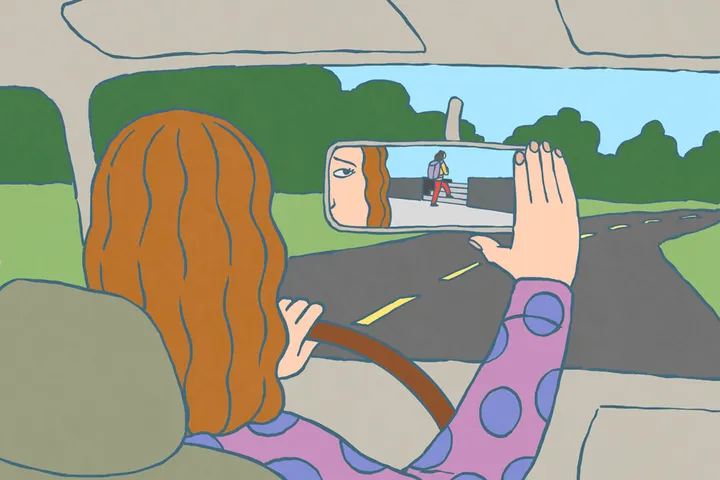In the winter of 2018 my father had admitted himself to a hospital, with extreme difficulty breathing. This came as a complete surprise to his family. Not wanting anyone to worry, he waited until he was already checked in to the hospital before messaging us. Even then he acted nonchalant, leaving out important bits of information. He failed to tell us that he was in the ICU, or that he had nearly been placed on life support multiple times.

It wasn’t until I visited him in person that I was able to witness the grave condition he was in. He was a shell of his normal self—barely able to speak or move, practically suspended by wires. The helplessness I felt while with him was unbearable. Even the simple act of being present seemed pointless , as I either kept him from sleeping or made him expend precious energy he couldn’t spare.
Time dragged, each day lingering sinisterly. While my father’s health barely improved, the responsibilities of life and work demanded my attention. I felt as though my father was frozen in a time capsule while the rest of the world, including his loved ones, marched forward without him.
That week, colleagues from In Touch Ministries and I had planned to host pastors and television producers from Yambol, Bulgaria. For an entire weekend, we would show Blagovest and Katya Belev around Atlanta, Georgia.
While I was enthusiastic to share my home country with ministry partners, most of that visit was a blur. My father’s condition remained at the forefront of my mind, hindering any ability to be in the moment. On the one hand, I knew if I was with my dad at the hospital, there was nothing I could do. He probably wouldn't even be conscious most of the time, or able to speak. But on the other hand, every moment apart felt like a moment I was abandoning him.
Blagovest and Katya were perfectly suited to distract me from a looming fog of dread. Although they were visiting the United States to attend a media conference, they purposefully set aside time to visit with us. With a camera constantly around his neck, Blagovest never let a photographic opportunity pass us by—he was inquisitive and impressed by items I might have found mundane from their constant availability in my life.
Often he would share about the agony his country is experiencing in the area of physical health. I was surprised to learn that Bulgaria has one of the highest mortality rates in Europe. Economic issues plague the nation’s health care, leaving hospitals underfunded, while fraud and corruption erode the system.

The burden of medical care was apparent in the way Blagovest talked about his ministry. His lament over the sick in the congregation he pastors, his small prayers of emphasis on our health and well-being, and even his admiration of the pastors around the world tend to have an emphasis on healing and miracles. It was clear that physical health and well-being is a critical issue that he and his community are grappling with.
As the weekend progressed, my father’s condition worsened, and I knew on Sunday that I needed to visit him. During lunch after church, I disclosed to our guests what had been heavy on my mind all weekend. While I didn’t want to burden them with my own issues, I also felt a sense of deceit in not saying anything. Blagovest slowly grew more concerned as I told them about my father’s situation. He pulled out a pocket-sized vial. “May we pray for you, and anoint you with oil?” he asked quiely, his face reddening slightly.
All at once I realized that in my 30-plus years of life, I’d never before been asked this. I did not know how to respond. So I defaulted to trusting a new friend and told him he could.
Blagovest pulled out a soft white handkerchief and quickly tilted the vial on it. He then rubbed that part of the cloth on my wrists, and prayed in Bulgarian for my father and me. I couldn’t understand the words he was saying but was still moved to tears by his sympathy. We hugged and said our goodbyes, and I promised I would keep them updated on my father’s condition.

As I drove, I could still feel the dabs of oil on my wrists. Blagovest and Katya had continually reminded me of certain scriptural and theological points that I hadn’t till then given a second thought. Benefitting from a capable though still imperfect health care system, I’d never felt the need to really reflect on healing in the New Testament. What was missing from my view of God and Scripture simply because of my culture and where I was born?
I entered my father’s hospital room as a nurse was taking away a tray, doing a skip that seemed like a victory lap . I sat down in a seat beside him, still awkward in a hospital environment. I said hello and asked Dad how he was doing, only to be interrupted by the nurse, who returned to the room, exclaiming in a tone you would normally use to address a toddler, “Someone was finally able to swallow liquids!”
As if a light switch was flipped, my father’s improvement began on that day. After over a week of no definitive progress¸—and nearly being put on life support—he was finally able to swallow. It was the beginning of an unusually sudden recovery. Within a few days, he was released from the hospital. To see him active and engaged—and without the web of wires in the ICU—felt surreal, as if I had witnessed a resurrection. It was hard to recognize him as the feeble body I’d seen in the hospital bed earlier that week.
Before I had a chance to contact Blagovest with the good news, he reached out to me, checking in on my father’s condition. His questions were hopeful, anticipating my father’s healing. His voice and demeanor possessed the hope of someone who knew the struggles I’d experienced and yet emerged stronger because of them. It was a faith that Blagovest had learned to carry long ago—a faith that I still yearn for.





